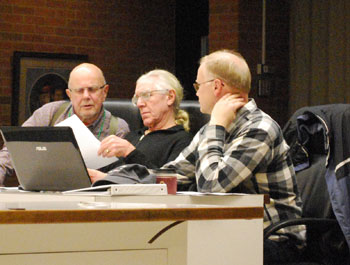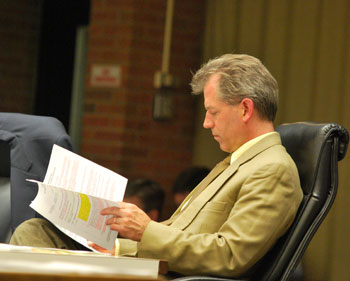Ann Arbor Marijuana Licenses: Who Decides?
At an April 2 meeting that lasted until midnight, the Ann Arbor city council handled several agenda items that could affect continued patient access to medical marijuana in Ann Arbor. The meeting also featured extensive public commentary on the topic of medical marijuana. In advance of publishing the full meeting report, The Chronicle offers this analysis of some of the medical marijuana-related issues that were discussed.
Most notably, the meeting featured remarks from city attorney Stephen Postema indicating that he believes medical marijuana dispensaries should not be in business now because they lack licenses: “… [dispensaries] can’t operate right now, they’re not allowed to operate at all – without a license.”
That contradicts the city’s ordinance, which allows dispensaries to operate while their license applications are still pending. (The city is still in the process of issuing its first licenses for dispensaries.) From the ordinance: “The medical marijuana dispensary may continue to operate pending final action on the application unless the Building Official determines that it must be closed for safety reasons.” When The Chronicle sent Postema an emailed query questioning the accuracy of his statement, he responded by insisting his statement was accurate. However, Postema declined to provide any foundation for his feeling that dispensaries lacking a license – even those with applications pending – are not allowed to operate by dint of having no license.
If dispensaries are assumed to be operating in violation of the Michigan Medical Marijuana Act, then they would not be allowed to operate – whether they had a license or not. However, at the April 2 meeting Postema did not identify a basis for such an assumption. He stopped short of describing an interpretation of a recent Michigan court of appeals ruling (the McQueen case) as banning all dispensaries, but said the ruling presented “severe difficulties” for dispensaries.
The council’s deliberations on Monday night can be understood in the context of a struggle between the city attorney’s office on the one hand, and some members of council and the medical marijuana licensing board. The struggle relates to who has the decision-making authority for awarding licenses, and when those licensing awards should be decided. From a formal, procedural point of view, it’s not an open question: The licensing board makes recommendations to the city council, which has the ultimate decision-making authority. The board has already recommended that licenses be awarded to 10 different dispensaries.
However, from a practical point of view, the council will act only under the advice of the city attorney’s office. Since the licensing and zoning ordinances were enacted by the city council last year, Postema has proceeded in a way that reserves a role for city staff in the licensing process that has an uncertain basis in the actual ordinances approved by the council. Revisions to those ordinances, meant in part to address some of those uncertainties, were part of the council’s April 2 agenda.
Here’s a summary of the outcome on medical marijuana issues at the April 2 meeting: (1) the council unanimously postponed consideration of licensing ordinance revisions until June 18 – the council’s second meeting that month; (2) on a 9-1 vote, the council approved giving direction to the city planning commission to review the zoning ordinance; and (3) on a 6-4 vote, the council tabled a resolution directing the city attorney to delay enforcement activities against dispensaries. A tabled resolution will demise if it’s not brought back off the table in six months.
Deliberations suggested in sum that the current arrangement in Ann Arbor, under which patients are still able to get medical marijuana from dispensaries, will persist at least until the city council votes on licenses. But the timing of that vote appears fairly uncertain, given the mixed signals currently being sent by the city attorney.
Provided in this article is analysis of some of the local issues related to medical marijuana licensing and zoning. The analysis culminates by showing how the interpretation of a single requirement in the city’s zoning ordinance – that dispensaries adhere to the Michigan Medical Marijuana Act – makes a significant difference in who makes the practical decision on whether dispensaries receive a license and can legally operate, and where the burden of proof lies for MMMA conformance. [Full Story]








